Fact-Finding Practicum
The Fact-finding Practicum was a full-year, seven credit practicum designed to enable students to study a human rights topic in depth. Taught by expert practitioners, students worked in small teams to develop a research methodology, conduct extensive interviews with stakeholders and affected persons, and draft a comprehensive human rights report on their findings.
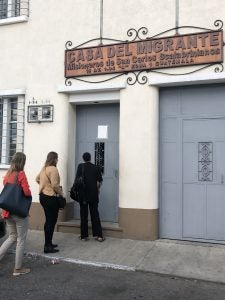
This practicum is not currently offered. For details on the Human Rights Advocacy in Action Practicum, please see this page.
New Report:
No Choice: Attacks on Health as a Driver of Forced Displacement in Syria
Past Reports:
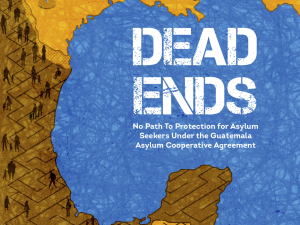
Dead Ends: No Path to Protection for Asylum Seekers Under the Guatemala Asylum Cooperative Agreement
In 2020-2021, the HRI Fact-Finding Project investigated the legality of the Guatemala ACA and its impact on the human rights of asylum seekers.
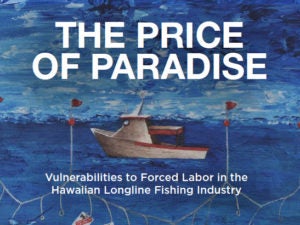
The Price of Paradise: Vulnerabilities to Forced Labor in the Hawaiian Longline Fishing Industry
In 2018-2019, the HRI Fact-Finding Project investigated forced labor among foreign fishermen in the Hawaii longline fishing industry. For a screen-reader accessible version of this report, please contact HRI's Dash-Muse Fellow.
Trapped: Cycles of Violence and Discrimination Against Lesbian, Gay, Bisexual, and Transgender Persons in Guyana.
In 2017-2018, the HRI Fact-Finding Project investigated cycles of violence and discrimination in against lesbian, gay, bisexual, and transgender (LGBT) individuals in Guyana. For a screen-reader accessible version of this report, please contact HRI's Dash-Muse Fellow.
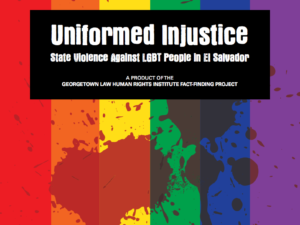
Uniformed Injustice: State Violence Against LGBT People in El Salvador
In 2016-2017, the HRI Fact-Finding Project investigated institutional violence targeting lesbian, gay, bisexual, and transgender (LGBT) individuals in El Salvador.
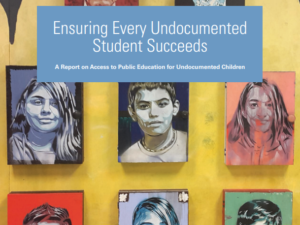
Ensuring Every Undocumented Student Succeeds
In 2015-2016, the HRI Fact-Finding Project and practicum course examined the right to education and access to public education for undocumented immigrant children in the United States.
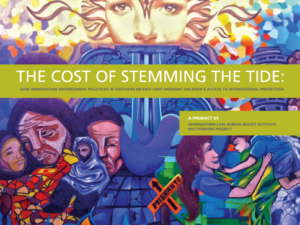
The Cost of Stemming the Tide
In 2014-2015, the HRI Fact-Finding Project and practicum course examined the the impact of immigration enforcement practices in Southern Mexico on migrant children's access to international protection.
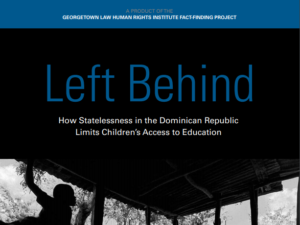
Left Behind: How Statelessness in the DR Limits Children's Access to Education
In 2013-2014, the HRI Fact-Finding Project and practicum course examined how statelessness in the Dominican Republic limits children's access to education.
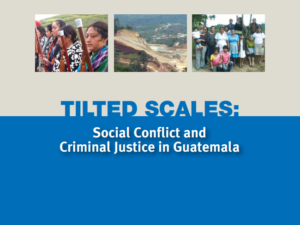
Tilted Scales: Social Conflict and Criminal Justice in Guatemala
In 2013, HRI published a report on social conflict and criminal justice in Guatemala following joint research and fact-finding with the American Bar Association's Center for Human Rights and the Robert F. Kennedy Center for Justice & Human Rights.
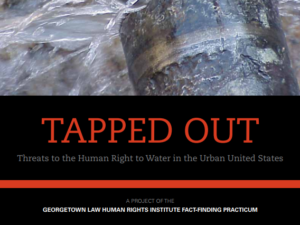
Tapped Out: Threats to the Human Rights to Water in the Urban U.S.
In 2012-2013, the HRI Fact-Finding Project and practicum course examined the human right to water in marginalized communities, including in Detroit and Boston.
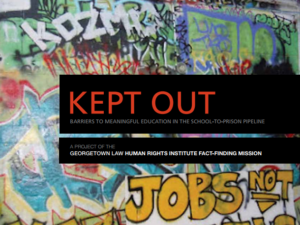
Kept Out: Barriers to Meaningful Education in the School-to-Prison Pipeline
In 2011-2012, the HRI Fact-Finding Project and practicum course examined the right to education of children in the United States in conflict with the law through fieldwork in Los Angeles.
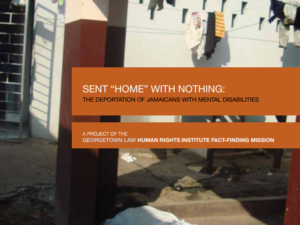
Sent "Home" With Nothing: The Deportation of Jamaicans with Mental Disabilities
In 2011-2011, the researchers visited Jamaica and conducted more than 50 interviews with deported persons, mental health professionals, civil society representatives, and government officials.
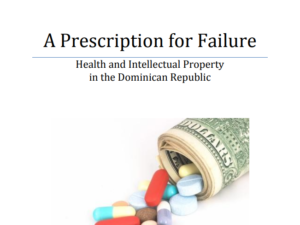
A Prescription for Failure: Health and Intellectual Property in the DR
In 2009-2010, researchers investigated the impact of of the DR-CAFTA trade agreement and intellectual property protections on access to affordable medicines in the Dominican Republic.
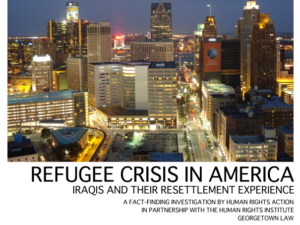
Refugee Crisis in America: Iraqis and Their Resettlement Experience
In 2008-2009, researchers examined and assessed the United States' policies, practices, and legal framework with regard to the resettlement of Iraqi refugees though interviews in Washington, D.C., Detroit, San Diego, and Amman, Jordan.
Moving Forward: Recommendations on U.S. HIV Immigration Policy (Haiti)
In 2008, researchers traveled to Haiti to document the experiences of HIV-positive spouses, children, parents, and siblings of U.S. citizens or Lawful Permanent Residents (LPRs) affected by the "HIV bar."
Between the Border and the Street: A Comparative Look at Gang Reduction Policies and Migration in the U.S. and Guatemala
In 2007, researchers examined the rise of gangs in Guatemala and the United States and assessed the anti-gang strategies in each country, compared the relative successes and failures, and offered recommendations.
Unintended Consequences: Refugee Victims of the War on Terror
In 2006, researchers investigated the the unintended consequences of counter-terror policies and the material support bar on Colombian refugees.
